Related Research Articles

Enrico Berlinguer was an Italian politician. Considered the most popular leader of the Italian Communist Party (PCI), he led the PCI as the national secretary from 1972 until his death during a tense period in Italy's history, which was marked by the Years of Lead and social conflicts, such as the Hot Autumn of 1969–1970. Berlinguer was born into a middle-class family; his father was a socialist who became a deputy and later senator. After leading the party's youth wing in his hometown, he led the PCI's youth wing, the Italian Communist Youth Federation (FGCI), at the national level from 1949 to 1956. In 1968, he was elected to the country's Chamber of Deputies, and he became the leader of the PCI in 1972; he remained a deputy until his death in 1984. Under his leadership, the number of votes for the PCI peaked. The PCI's results in 1976 remain the highest for any Italian left-wing or centre-left party both in terms of votes and vote share, and the party's results in 1984, just after his death, remain the best result for an Italian left-wing party in European elections, and were toppled, in terms of vote share in a lower-turnout election, in the 2014 European Parliament election in Italy.
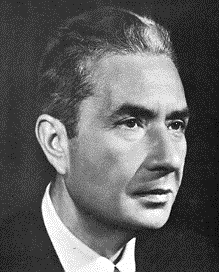
Aldo Romeo Luigi Moro was an Italian statesman and prominent member of Christian Democracy (DC) and its centre-left wing. He served as prime minister of Italy in five terms from December 1963 to June 1968 and from November 1974 to July 1976.

The Italian Communist Party was a communist and democratic socialist political party in Italy. It was founded in Livorno as the Communist Party of Italy on 21 January 1921, when it seceded from the Italian Socialist Party (PSI), under the leadership of Amadeo Bordiga, Antonio Gramsci, and Nicola Bombacci. Outlawed during the Italian fascist regime, the party continued to operate underground and played a major role in the Italian resistance movement. The party's peaceful and national road to socialism, or the "Italian Road to Socialism", the realisation of the communist project through democracy, repudiating the use of violence and applying the Constitution of Italy in all its parts, a strategy inaugurated under Palmiro Togliatti but that some date back to Gramsci, would become the leitmotiv of the party's history.

Palmiro Michele Nicola Togliatti was an Italian politician and leader of Italy's Communist party for nearly forty years, from 1927 until his death. Born into a middle-class family, Togliatti received an education in law at the University of Turin, later served as an officer and was wounded in World War I, and became a tutor. Described as "severe in approach but extremely popular among the Communist base" and "a hero of his time, capable of courageous personal feats", his supporters gave him the nickname il Migliore. In 1930, Togliatti renounced Italian citizenship, and he became a citizen of the Soviet Union. Upon his death, Togliatti had a Soviet city named after him. Considered one of the founding fathers of the Italian Republic, he led Italy's Communist party from a few thousand members in 1943 to two million members in 1946.

Luigi Longo, also known as Gallo, was an Italian communist politician and general secretary of the Italian Communist Party from 1964 to 1972. He was also the first foreigner to be awarded an Order of Lenin.
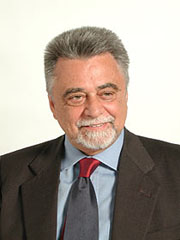
Achille Leone Occhetto is an Italian political figure. He served as the last secretary-general of the Italian Communist Party (PCI) between 1988 and 1991, and was the first leader of the Democratic Party of the Left (PDS), the parliamentary socialist successor of the PCI, from 1991 to 1994.
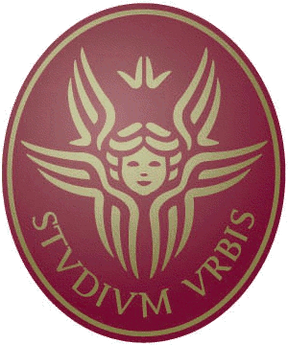
The Sapienza University of Rome, formally the Università degli Studi di Roma "La Sapienza", abbreviated simply as Sapienza, is a public research university located in Rome, Italy. It was founded in 1303 and is as such one of the world's oldest universities, and with 122.000 students, it is the largest university in Europe by enrollment. Due to its size, funding, and numerous laboratories and libraries, Sapienza is a major education and research centre in Southern Europe. The University is located mainly in the Città Universitaria, which covers 44 ha near the Tiburtina Station, with different campuses, libraries and laboratories in various locations in Rome.
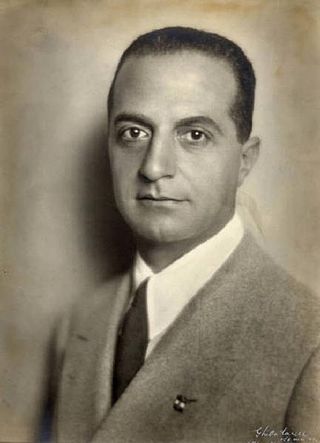
Giuseppe Bottai was an Italian journalist and member of the National Fascist Party of Benito Mussolini.
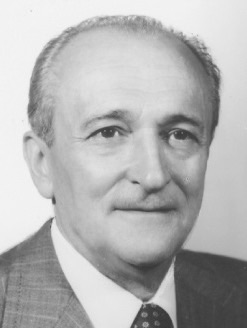
Alessandro Natta was an Italian politician and secretary of the Italian Communist Party (PCI) from 1984 to 1988. An illuminist, Jacobin, and communist, as he used to describe himself, Natta represented the political and cultural prototype of a PCI militant and party member for over fifty years of the Italian democratic-republican history. After joining the PCI in 1945, he was deputy from 1948 to 1992, a member of the PCI's central committee starting in 1956, was part of the direction from 1963 and of the secretariat, first from 1962 to 1970 and then from 1979 to 1983, and leader of the PCI parliamentary group from 1972 to 1979; he was also the director of Rinascita from 1970 to 1972. After 1991, he did not join the PCI's successor parties.

The 1968 Italian general election was held in Italy on 19 May 1968. The Christian Democracy (DC) remained stable around 38% of the votes. They were marked by a victory of the Communist Party (PCI) passing from 25% of 1963 to c. 30% at the Senate, where it presented jointly with the new Italian Socialist Party of Proletarian Unity (PSIUP), which included members of Socialist Party (PSI) which disagreed the latter's alliance with DC. PSIUP gained c. 4.5% at the Chamber. The Socialist Party and the Democratic Socialist Party (PSDI) presented together as the Unified PSI–PSDI, but gained c. 15%, far less than the sum of what the two parties had obtained separately in 1963.

The Italian Democratic Socialist Party, also known as Italian Social Democratic Party, was a social-democratic political party in Italy. The longest serving partner in government for Christian Democracy, the PSDI was an important force in Italian politics, before the 1990s decline in votes and members. The party's founder and longstanding leader was Giuseppe Saragat, who served as President of the Italian Republic from 1964 to 1971. Compared to the like-minded Italian Socialist Party on the centre-left, it was more centrist, but it identified with the centre-left.

Aldo Fabrizi was an Italian actor, director, screenwriter and comedian, best known for the role of the heroic priest in Roberto Rossellini's Rome, Open City and as partner of Totò in a number of successful comedies.
Limes is a monthly Italian geopolitical magazine published in Rome, Italy.
Umberto Barbaro was an Italian film critic and essayist.
Events from the year 1891 in Italy.
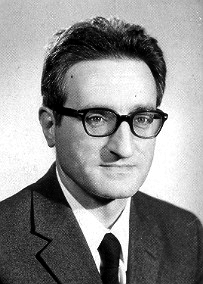
Aldo Tortorella is an Italian journalist, former politician and partisan. He was a historical member of the Italian Communist Party.

The Communist Party of Italy (Marxist–Leninist) was a political party in Italy. It was at one time Italy's largest Maoist group, until it changed affiliation and sided with Albania.

Emilio Sereni was an Italian writer, politician and historian.

The Brigate Garibaldi or Garibaldi Brigades were partisan units aligned with the Italian Communist Party active in the armed resistance against both German and Italian fascist forces during World War II.
Vie Nuove was a weekly popular magazine published in Rome, Italy, between 1946 and 1978. The magazine was one of the post-war publications of the Italian Communist Party which used it to attract larger sections of the population.
References
- ↑ "Critica marxista". Dialnet. Retrieved 30 July 2020.
- 1 2 "Critica marxista: rivista bimestrale/diretta da Luigi Longo e Alessandro Natta". Opac SBN. Retrieved 30 July 2020.
- 1 2 "Critica marxista". University of Bologna. CRIS. Retrieved 30 July 2020.
- 1 2 3 4 5 "Chi Siamo". Ediesse Online. Retrieved 30 July 2020.
- ↑ "Critica marxista. Indici 1963-1972. Rivista bimestrale. 1974". Bergoglio Libri. Retrieved 30 July 2020.
- ↑ "Chi siamo - Critica marxista". Futura Editrice (in Italian). Retrieved 1 February 2024.